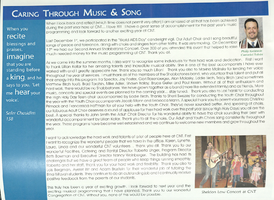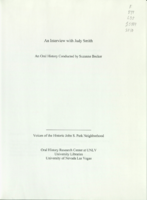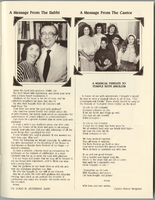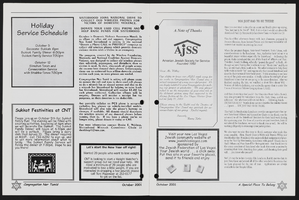Search the Special Collections and Archives Portal
Search Results

Annual report from Congregation Ner Tamid, 2009-2010
Date
Archival Collection
Description
Annual report from Congregation Ner Tamid, 2009-2010
Text

Myron Martin and Don Snyder interviews, November 30, 2017, December 06, 2017, and March 08, 2018: transcript
Date
Archival Collection
Description
Part 1: Interviewed by Stefani Evans. Myron G. Martin, President and CEO, and Donald D. Snyder, Chairman of the Board of Directors, share their memories of the founding of The Smith Center for the Performing Arts from the first non-for-profit foundation formed in 1996. The second iteration led by Snyder in 1999 brought in Martin--former Director of UNLV Performing Arts Center--and created a sustainable business plan for a center for the performing arts that would be accessible geographically and culturally for all segments of Nevada society. Here, Martin and Snyder recall how land, funding, and legislation for The Smith Center depended on the ""power of the project"" and the Snyder-Martin team's ability to overcome skeptics in the public, the Nevada Legislature, the Clark County Commission, the Las Vegas City Council, and the Don Reynolds Foundation. Martin and Snyder satisfied the various requirements for each organization and earned unanimous approval at each stop--in fact, the $50 million donation to The Smith Center was the largest the Don Reynolds Foundation had ever granted largest. That the approvals came on three consecutive days from competing municipal jurisdictions makes the accomplishment even sweeter. Subjects: Las Vegas, NV; Cultural center; Performing arts; The Smith Center for the Performing Arts; The Smith Center; Not-for-profit;; Nevada Legislature; Clark County Commission; Las Vegas City Council; The Don Reynolds Foundation; Fundraising; Planning; Endowment; Part 2: Interviewed by Stefani Evans. Martin, who was the youngest of three boys raised in suburban Houston, Texas, likes to say that in college at the University of North Texas he played for the Atlanta Braves and the Texas Rangers. So he did--as the organist. He earned a Bachelors of Music in piano, organ, and voice and an MBA from Golden Gate University. He came to Las Vegas after a fifteen-year career with the Baldwin Piano Company as executive director of the Liberace Foundation; he later became president of UNLV?s Performing Arts Center and in 1999 he became president of the Las Vegas Performing Arts Center Foundation. Here, Martin and Snyder recall the process whereby they hired architect David Schwarz of Washington, DC, to create The Smith Center's ""timeless, elegant"" look; creating a ""shared vocabulary"" by visiting 14 performing venues in 5 European countries; the City of Las Vegas's RFP that resulted in hiring Whiting-Turner Contracting Company; the exterior art/artists, significance of the bell tower, Founding Fifty(seven), and the ability of the theater to adapt from staging The Book of Mormon to staging a community funeral for two slain police officers. Subjects: The Smith Center; The Smith Center for the Performing Arts; Architecture; Fundraising; Acoustics; Public private partnerships; Request for proposals; Whiting-Turner; Theater Projects Group; vocabulary; Part 3: Interviewed by Stefani Evans. Author Jack Sheehan, joining this third session on The Smith Center in his role as Don Snyder's biographer, explains the way he envisions the place of The Smith Center in the larger context of Las Vegas. Martin and Snyder provide names for the group that grew out of the Call to Action meeting and founded the original Las Vegas Performing Arts Foundation. They share anecdotes of a 2005 trip, wherein they were joined by Las Vegas City Councilman Lawrence Weekly, City of Las Vegas Mayor Oscar Goodman, and consultant to the City of Las Vegas Dan Van Epp to visit City Place and the Kravis Center for Performing Arts in West Palm Beach as an example of a place where a performing arts center was a catalyst for revitalization in an area of underused and underutilized urban land. They discuss opening night, March 10, 2012, /From Dust To Dreams: Opening Night at the Smith Center For The Performing Arts/, which was produced broadcast live on national Public Broadcasting System (PBS) television stations, produced by George Stevens Jr. and directed and produced by Michael Stevens for The Stevens Company; hosted by Neil Patrick Harris; and featuring Jennifer Hudson, Willie Nelson, Merle Haggard, Emmylou Harris, Martina McBride, Carole King, Arturo Sandoval, Joshua Bell, Mavis Staples, Pat Monahan; American Ballet Theater dancers Marcello Gomes and Luciana Paris; also Broadway performers Brian Stokes Mitchell, Laura Osnes, Cheyenne Jackson, Sherie Rene Scott, Montego Glover, and Benjamin Walker. Martin describes how provisions of Nevada SB235--introduced March 6, 2017, signed into law by Governor Bob Sandoval, and became effective October 1, 2017--for the regulation of ticket sales to an athletic contest or live entertainment event affect The Smith Center ticket sales. They talk of providing 3,600 good construction jobs during the recession, of Discovery Childrens Museum, of future development plans for the entire 61-acre Symphony Park parcel, and of a second capital campaign to increase the endowment to $100 million to enable The Smith Center to be economically sustainable.
Text

Transcript of interview with Marie Horseley by Suzanne Becker, June 13, 2007
Date
Archival Collection
Description
Twenty years after her birth in Utah in 1924, Marie Horseley met and married her husband who was an engineer for the Union Pacific Railroad. They settled in Las Vegas, his home town and soon purchased a home for $9800 in the new John S. Park neighborhood. Sixty years later Marie, twice a widow, remains in the home. Up the street four doors, one of her granddaughters lives with her three children. Marie recalls the new housing development that appealed to railroad workers. The roads were dirt and there were no streetlights, but soon a community blossomed. Marie is a self-described quiet resident; her life was about raising her three daughters and being a member of the LDS church. However, she knew everyone on her street no matter their religious affiliation. Today the businesses are gone. Homes have changed appearances over the years as owners have changed. Ethnic diversity is apparent and the sense of community closeness has slipped away for her. Yet she loves her place there, feels safe and secure. When asked about the ides of John S. Park being designated a historic district, she is not all that wowed by the idea of restrictions that might be included in that. Nevertheless, she has no intention of relocating from the comfort of the place she has called home all these years.
Text

Transcript of interview with Judy Smith by Suzanne Becker, November 22, 2008
Date
Archival Collection
Description
Judy Smith was a teenager when her family relocated from Barstow, CA to Las Vegas in 1958. It was a wide open setting, an ideal location for riding her horse. It was also an era of growth as the city became a gambling destination and the Strip became dotted with early casinos and hotels. Judy attended Las Vegas High School, worked for the Las Vegas Sun and earned a scholarship to UNR. By 1967, she was married and moving back to Vegas with her young family. They chose the John S. Park Neighborhood as the place to call home. For Judy living in John S. Park is about a "sense of place" and "a sense of timelessness." She describer the evolution of the neighborhood and the greater Las Vegas community from the pioneers to the contemporary leaders. In 2006, Judy's home was gutted by a fire. Her life was saved by an observant neighbor. She could have relocated at the time, but chose not to move from the area that she has called home for over 40 years.
Text
Florence Lee Jones and John Cahlan Papers
Identifier
Abstract
The Florence Lee Jones and John Cahlan Papers (1929-1983) contain material created by the couple related to their work at the
Archival Collection

Transcript of interview with Stella Champo Iaconis by Kay Long, May 14, 1997 & September 1997
Date
Archival Collection
Description
The Champo family, Jacinta and Manuel Champo and their daughter Stella came from Italy to Las Vegas in 1912. They lived in a room at the Union Hotel, which was located at Main and Bridger. In 1917, the Champo family bought a small ranch located about three miles south of what is Henderson today. Manuel grew fruits and vegetables at the ranch and sold them in town door to door. Stella began her education at Las Vegas Grammar School at Fourth and Bridger in 1918 and started babysitting for many of the local women when she was only ten years old. Jacinta’s death in 1927 was hard on both Stella and Manuel. Stella decided not to finish her education. Maude Frazier, who was the principal at the High School, tried to persuade Stella to stay at school. However, Stella had no more interest in school and at eighteen years old she started her career as a waitress. Her first job was at a small Italian restaurant at the Union Hotel where she learned the business. She worked as a waitress and cashier and when P.O. Silvagni opened the Apache Hotel at Second and Fremont she went to work there. Stella continued to work at the Apache until she moved to Los Angeles where she worked as a waitress for eighteen years. Stella had married John Iaconis in 1953 and they moved back to Las Vegas. Both John and Stella went to work at the Sahara Hotel. Stella was a showroom waitress and John was a tailor with his own valet shop in the Sahara Hotel. Stella worked in a showroom at Sahara for three years because it was physically demanding work. Stella went to work at Larry’s where she stayed for twenty years. Stella continued to live in Las Vegas until her death on January 18, 1998 . She was happily retired and always remembered the past and the lessons she learned from her hard work. Stella was a very optimistic and totally self-reliant woman.
Text

Transcript of interview with Peter Perazzo by Claytee White, July 22, 2016
Date
Archival Collection
Description
Peter Perazzo, a land surveyor born and raised in Las Vegas, talks about his family, his Native American ancestry, and how construction and land surveying have changed over the years. Peter’s father, Frederick Perazzo, moved temporarily to Las Vegas from Reno in the 1940s to find employment. He worked as a draftsman, and later an architect. He designed public building and residential buildings around the valley as well as at Area 51 (Atomic Test Site). His temporary move became permanent in 1953 with the purchase of a family home in Northwest Las Vegas, across from Twin Lakes. Peter’s early life was spent playing in clover in the family’s yard and enjoying his four grandmothers. Peter began his land surveying career working for the Bureau of Land Management (BLM) in 1985. He describes how he became hooked on the profession and describes surveying terms like monuments, townships, and “the dumb end of the tape”. Later Peter worked for the Nevada Department of Transportation, where he wa
Text

Steve Jones and Bart Jones interview, Novermber 7, 2016: transcript
Date
Archival Collection
Description
Brothers Steve and Bart Jones live and breathe Las Vegas history. Their grandparents, Burley and Arlie Jones, arrived in Las Vegas in the nineteen-teens; their father, Herb Jones; his sister, Florence Lee Jones Cahlan, and their uncle, Cliff Jones, helped form the legal, journalistic, and water policy framework that sustains Southern Nevada today. The Jones brothers build on that foundation through their custom home-building company, Merlin Construction. In this interview, they talk about living and growing up in Las Vegas, of attending John S. Park Elementary School, of hunting in the desert, of their family's commitment to cultural and racial diversity, and of accompanying their grandfather to his business at the Ranch Market in the Westside. They share their early work experiences lifeguarding and later, dealing, at local casinos as well as second-hand memories of the Kefauver trials through the tales told by their father and uncle. Steve describes mentor Audie Coker; he explains
Text


